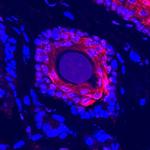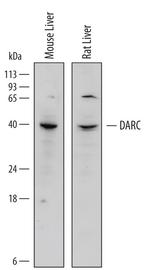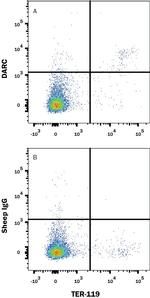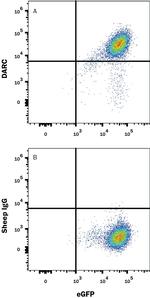Search Thermo Fisher Scientific
FIGURE: 1 / 4
DARC Antibody (PA5-47861) in IHC (F)




Product Details
PA5-47861
Species Reactivity
Published species
Host/Isotype
Class
Type
Immunogen
Conjugate
Form
Concentration
Purification
Storage buffer
Contains
Storage conditions
Shipping conditions
RRID
Product Specific Information
Reconstitute in sterile PBS to a final concentration of 0.2 mg/mL.
Target Information
ACKR1 or DARC is an atypical chemokine receptor that controls chemokine levels and localization via high-affinity chemokine binding that is uncoupled from classic ligand-driven signal transduction cascades resulting instead in chemokine sequestration, degradation, or transcytosis. ACKR1 is also known as an interceptor (internalizing receptor) or chemokine-scavenging receptor or chemokine decoy receptor. It has a promiscuous chemokine-binding profile by interacting with inflammatory chemokines of both the CXC and the CC subfamilies but not with homeostatic chemokines. ACKR1 also acts as a receptor for chemokines including CCL2, CCL5, CCL7, CCL11, CCL13, CCL14, CCL17, CXCL5, CXCL6, IL8/CXCL8, CXCL11, GRO, RANTES, MCP-1, TARC and for the malaria parasites P.vivax and P.knowlesi.
For Research Use Only. Not for use in diagnostic procedures. Not for resale without express authorization.
Bioinformatics
Protein Aliases: Atypical chemokine receptor 1; CD234; CD234 antigen; CTA-134P22.3; Duffy Antigen; Duffy antigen receptor for chemokines; Duffy antigen/chemokine receptor; Duffy blood group, atypical chemokine receptor; Duffy blood group, chemokine receptor; Fy Antigen; FYDuffy blood group; glycoprotein D; GPDWBCQ1; HGNC:4035; OTTHUMP00000060081
Gene Aliases: AA162249; Ackr1; CCBP1; CD234; Darc; Dfy; ESTM35; FY; GPD
UniProt ID: (Mouse) Q9QUI6
Entrez Gene ID: (Rat) 689105, (Mouse) 13349

Performance Guarantee
If an Invitrogen™ antibody doesn't perform as described on our website or datasheet,we'll replace the product at no cost to you, or provide you with a credit for a future purchase.*
Learn more
We're here to help
Get expert recommendations for common problems or connect directly with an on staff expert for technical assistance related to applications, equipment and general product use.
Contact tech support
